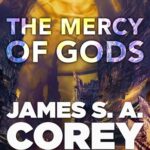
Genres: Queer Protagonists, Sci Fi
Representation: Sapphic autistic MC, sapphic MC, F/F or wlw, secondary nonbinary characters, genderfluid PoV character, pansexual MC, queernorm world
Published on: 13th July 2021
ISBN: 0857668684
Goodreads

The laws of physics acting on the planet of Jai have been forever upended; its surface completed altered, and its inhabitants permanently changed. The artificially intelligent Gods that ruled the galaxy, fearing heresy and chaos, have become the planet’s jailers. Tiv Hunt once trusted these Gods absolutely, but now her world has changed and her allegiance has shifted.
Now Tiv spends her days helping the last remaining survivors of Jai. Everyone is fighting for their freedom against unthinkable odds, and they call out for drastic action from their saviour, Yasira. But she has become deeply ill, debilitated by her Outside exposure, and she struggles to keep breathing let alone lead a revolution.
Hunted by the Gods, and Akavi, the disgraced angel, Yasira and Tiv them must delve further than ever before into the maddening mysteries of their fractured planet in order to save – or perhaps destroy – their fading world.
I received this book for free from the publisher via NetGalley in exchange for an honest review. This does not affect my opinion of the book or the content of my review.
Highlights
~but why do you want weapons
~hiveminds
~magic portal-doors are very convenient
~Strike Team gets shit done
~#EluStillDeservesBetter
This review contains spoilers for book one in the series, The Outside!
When I read The Outside for the first time, I believed it was a standalone – it had an ending that wrapped up the main story, but left enough room that the reader could be satisfied that Life Would Go On once the final page was turned. I adored it and was perfectly happy with that ending.
But it wasn’t a standalone, we got more story, and it is freaking awesome!
Which is maybe a weird thing to say, because The Fallen is a much grimmer book than The Outside was. The Outside was about fighting a clear enemy, more or less (although it ended up being far more complicated than that, because Hoffman is brilliant and doesn’t talk down to their readers), whereas The Fallen is…the aftermath.
And the aftermath isn’t very pretty.
Yasira saved a lot of lives at the end of the previous book by mitigating the worst effects of the Chaos Zone – a fifth of the planet Jai, which Talirr, Yasira’s once-mentor, infected with the forces of the Outside. But in doing so, she made herself an enemy of the AI Gods who rule human space – and broke herself on a fundamental level. What at first looks like severe trauma and depression is soon revealed to be something much more arcane and harder to heal – maybe impossible to fix.
Yasira’s current psychological state is at complete odds with her reputation. The people of the Chaos Zone now call her Saviour, and although she hasn’t appeared in public since her miracle, there’s more than a little hero worship going on. But it’s Tiv – Yasira’s girlfriend – who’s been nicknamed Leader; not of any kind of resistance group, exactly, but of the small team of Talirr’s ex-students who use their various Outside abilities to help the people of the Chaos Zone as much as they can. Tiv herself doesn’t have any powers – at least, not any Outside ones; I’d argue that her empathy, compassion, and hopepunk-style optimism definitely count as superpowers. Especially since she’s co-ordinating a number of nuerodiverse and traumatised people, which is like herding cats on a good day.
We didn’t get to see a lot of Tiv in the previous book – although what we saw, I liked – and it was really wonderful that she got to be front-and-centre in The Fallen. In The Outside, we heard Yasira repeatedly refer to Tiv as a ‘good girl’, but I don’t think Yasira really comprehended how accurate that is; Yasira meant that Tiv was a rule-follower, both in the social, cultural sense and in the religious sense, but Tiv actually is a ridiculously good person. If I hadn’t encountered one or two people like her before in my life, I’m not sure I’d have bought into the character, she’s that wonderful. She’s not impossibly perfect, it’s not that she can accomplish everything she sets her mind to and easily overcome everything the world is throwing at her: it’s just that she is unspeakably, unstintingly kind, even when she’s under an incredible amount of pressure. She’s always considerate, never forgets what those around her might find triggering, is gentle even when things are difficult. When she’s tired or frustrated or scared, she mostly manages to keep it to herself. She’s always looking to lighten the load of others. It’s just kind of amazing to read.
And I think it was an excellent narrative choice to feature Tiv, because she is someone who really did believe that the Gods were good. She is still, despite everything, anti-violence. When the people her team are helping start asking for weapons, she refuses. She’s not the kind of character I’m used to seeing in situations like these, and in some way I can’t define, that made it all more real to me. In many ways, Tiv is the ideal person, and so seeing how she navigated the riptides they’re in… It’s just different to see a character with such strong principles and with so much compassion not just in a leadership role, but also facing an immense enemy and an impossible situation. The Gods want them all destroyed, the angels are shooting and kidnapping people…and Tiv grits her teeth and refuses to despair. Refuses to be grimly practical and turn passive resistance into a war.
It’s just…kind of awesome?
Of course, there are many people who disagree with her, and it’s not hard to understand why some people are asking for weapons, why others are demanding that they fight back. It’s really easy to sympathise with them! But I had a bit of a galaxy-brain moment when Tiv decided the team’s response to requests for weaponry would be ‘Why?’
“What do you want them for?”
…”Defense, of course. Weren’t you listening?”
…”No, I mean, what are your objectives. I’m going to be honest with you, Mr. Akiujal, people have been asking us for weapons more and more and we’re starting to want to know why. I know that you fear for your safety, but that’s not enough reason by itself. What are you planning to defend – a location? A group of people? A team while they do a specific task?”
It’s probably a bad sign that it sounds so revolutionary for someone to just ask why do you want weapons? We all just kind of understand that in scary situations, we want guns. I’ve never seen someone question that, but once I read it, I realised that most of the time – at least in fiction – we’re not presented with an objective. Usually there is no specific, carefully-thought-out reason why. People want weapons because weapons make them feel safe, not because they necessarily know how to use them or what to do with them.
That…feels like a very big thing. It feels like something we should all be thinking a lot about, now.
In the case of the Chaos Zone, weapons aren’t really going to be much help: the angels guarding the borders can’t be properly hurt by human weapons, and the Outside monsters – well, they’re not indestructible, but good luck guessing what will hurt them. And the monsters aren’t the real issue, anyway. Not really.
It’s the other monsters, the ones that call themselves Gods and angels, that are the real problem. And I really did love learning more about them in this book – even if what I learned just grew more and more horrifying. When I reviewed The Outside, I said that I didn’t think humanity was living in a dystopia; I’m not 100% sure I still believe that, now I know more about how they operate. Granted, most of what we see is focussed on Nemesis, who has been presented as The Scary God from page one – but I’m going to need some evidence that the other Gods don’t work the same way before I give them a pass.
Is it a dystopia if the awfulness is happening out of sight of most civilians? What does it mean, that most of us can be perfectly happy to keep living our lives while terrible things go on? While we know they go on? That’s not just a question for the humans in Hoffman’s stories; that’s a question for all of us.
The Outside began with a single enemy, and a mission to stop her (Talirr). It grew more complicated than that, but that’s where we were when the book started. The Fallen isn’t that simple at any point. The enemy now isn’t a single human woman; it’s the Gods themselves, and they are just too big and too powerful to fight. It’s hopeless, and it makes for some grim reading.
But The Fallen is very much about hope: the bitter, grit-your-teeth kind of hopepunk. The Chaos Zone isn’t a utopia in the sense that life is anything like easy there – it isn’t. But there’s something very utopian about the way the people there have come together. Over and over again, it’s emphasised how the Chaos Zone has pulled together; how people share what they have and contribute as much as they can contribute. How, even if they grumble and mutter about it, they pull in and help each other; to repair roofs, to treat injuries, to have enough to eat. It’s heartwarming, and no, I don’t think it’s unbelievable. Historically, this is very much how people in disaster zones behave; humans don’t revert to club-carrying cavemen when things go bad, no matter what the general media tries to say. You can check out Humankind: A Hopeful History by Rutger Bregman for more about that, if you like.
To get back to my point: The Fallen is a story about how to fight when you can’t fight. It’s a story about different kinds of resistance. It’s a story about losing faith and finding it again in something else – in each other, instead of in computer gods. The situation the characters are in, in The Fallen, seems hopeless, but Hoffman’s story is about holding on to hope anyway. About working together to make things a little bit easier, a little bit better, for everyone. And even, I think, about how there’s no such thing as a broken person. There’s just different kinds of people, who can do and contribute different things, and that’s okay.
The Fallen releases this coming Tuesday. I think you ought to read it. (Just make sure you’ve read The Outside first!)






Leave a Reply